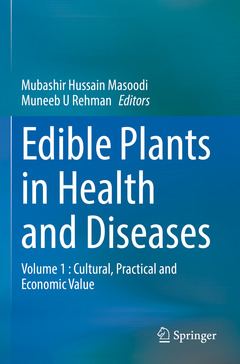Edible Plants in Health and Diseases, 1st ed. 2022 Volume 1 : Cultural, Practical and Economic Value
Coordonnateurs : Masoodi Mubashir Hussain, Rehman Muneeb U

The book provides significant information on some of the promising edible medicinal plants and how these possess both nutritive as well as medicinal value. The significance of these edible plants in traditional medicine, their distribution in different regions and the importance of their chemical constituents are discussed systematically concerning the role of these plants in ethnomedicine in different regions of the world. The current volume focuses on the economic and culturally important medicinal uses of edible plants and a detailed survey of the literature on scientific researches of pharmacognostical characteristics, traditional uses, scientific validation, and phytochemical composition, and pharmacological activities. This book is a single-source scientific reference to explore the specific factors that contribute to these potential health benefits, as well as discussing how to maximize those potential benefits. Chemists, food technologists, pharmacologists, phytochemists aswell as all professionals involved with quality control and standardization will find in this book a valuable and updated basis for their work.
Dr. Mubashir Hussain Masoodi is presently working as associate professor in the department of pharmaceutical sciences at the University of Kashmir, J&K, India. He holds PhD in pharmaceutical chemistry from School of Pharmaceutical Education & Research (SPER), Jamia Hamdard, New Delhi, India and postdoctoral fellowship from National Center for Natural Products (NCNPR), University of Mississippi, USA. Dr. Masoodi has more than 20 years of teaching and 10 years of research experience and in the field of Natural Product Research. He is the recipient of several national and international fellowships and awards such as Indo-US UGC Raman Postdoctoral Fellowship, Young Scientist Award-2010 by J & K State Council for Science & Technology and best publication award by Indian Drug Manufacturer’s Association (IDMA), Mumbai. He has published more than 75 research papers in peer-reviewed, international journals, and has 3 book chapters to his credit. He is on editorial and review board ofmany reputed high-impact, international scientific journals. Currently, Dr. Masoodi is engaged in isolation of bioactive compounds from medicinal plants, their semi-synthetic modification as well as their screening to check their biological activities for drug discovery.
Dr. Muneeb U Rehman is a faculty member at College of Pharmacy, King Saud University, Riyadh, Saudi Arabia. He holds a doctorate in toxicology (specialization in cancer biology and natural product research) from Jamia Hamdard, New Delhi, India. Dr. Rehman has more than 10 years of research and teaching experience in the field of toxicology, biochemistry, cancer biology, natural product research and pharmacogenomics. He is the recipient of several national and international fellowships and awards. He has published more than 100 research papers in peer-reviewed, international journals, and has 3 edited books and 26 book chapters to his name. Dr. Rehman is on the editorial boards and is a reviewer of severalh
Date de parution : 01-2023
Ouvrage de 388 p.
15.5x23.5 cm
Date de parution : 01-2022
Ouvrage de 388 p.
15.5x23.5 cm
Disponible chez l'éditeur (délai d'approvisionnement : 15 jours).
Prix indicatif 210,99 €
Ajouter au panierThèmes d’Edible Plants in Health and Diseases :
Mots-clés :
Edible plants; Phyto-chemicals; Pharmacology; Antioxidants; Anti-cancer; Human health



